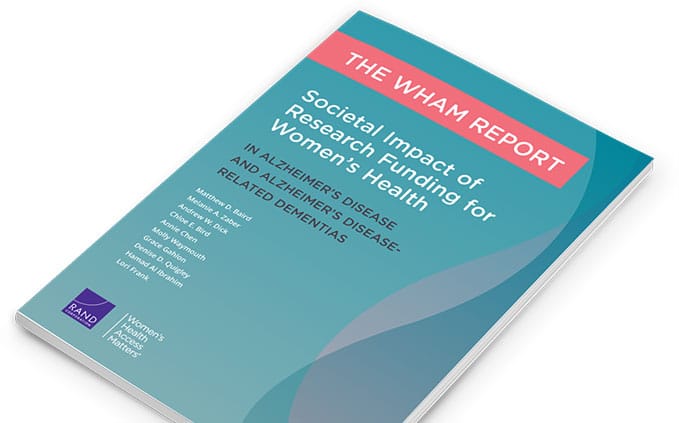At AAIC, Phil Gutis and the Judy Fund's Elizabeth Gelfand Stearns talk about what we still don't know about Alzheimer's in women versus men. Is this new generation of Alzheimer's drugs able to bridge the gap?
As I prepared to board the plane to Amsterdam for the Alzheimer’s Association International Conference, an email from the news site Axios caught my attention. The email included news about the newly approved Alzheimer’s drug Leqembi, which won full approval from the FDA recently.
But Axios reported that a supplementary analysis found that the rate of the disease slowing was lower for women than for men in the study. The drug slowed cognitive decline in women by 12 percent compared to 43 percent in men.
Eisai, which makes Leqembi, cautioned that the disparity was not statistically significant and argued that both men and women showed slowing of decline.
“You would get data that looks like this if you were flipping a coin,” Christopher van Dyck, the lead researcher on Leqembi’s clinical trial and the founder and director of the Alzheimer’s disease research unit at Yale University School of Medicine, told Axios. But at the same time, “Based on this data, if you had to make a bet on a male versus a female subject, how well they would do or likely to benefit, absolutely, you’d bet on the male.”
Even with all the caveats, 12 versus 43 seems like a stunning number — and one that shows us how little we still know about the impact of these disease-modifying drugs. Clearly, they represent a landmark change for the Alzheimer’s community (more on that below), but much more work needs to be done to fully understand their impact. (I’ve been on Aduhelm, another of the disease-modifying drugs approved by the FDA for most of the last seven years and think it has done me a world of good.)
With the news from Axios still bouncing around in my head, I was intrigued when I saw that Elizabeth Geland Stearns, the head of the Judy Fund, won the Alzheimer’s Association’s annual Philanthropist of the Year award at AAIC’s opening plenary session here in Amsterdam.
Stearns, who lost both her mother and grandmother to Alzheimer’s, runs the Judy Fund, which was established in 2003 by her father, Marshall Gelfand. Since then, the fund has raised $10 million and funded more than 20 peer-reviewed research projects, including many that were part of the Women’s Alzheimer’s Research Initiative.
I sat down with Stearns to get her take on the state of the Alzheimer’s world, particularly as it relates to women, who represent two thirds of the people diagnosed with cognitive illnesses, and how our country’s medical systems can ensure access to these new disease-modifying drugs.
Stearns had not heard about the Leqembi data but acknowledged that research has not yet provided the answers for women suffering from cognitive diseases.
“We have the facts, but we don’t have the answers for women,” she told me, adding that the impact of menopause and hormonal changes due to childbirth also need to be studied more closely.
“We know that men go through one hormonal change in their lives at puberty but women go through three: puberty, childbirth and menopause,” Stearns said. “So there has to be some level of deep focus on the relationships of hormonal change and brain activity around Alzheimer’s.”
When asked if she was optimistic that the nation’s medical systems could get itself ready to handle an onslaught of Alzheimer’s patients, Stern pointed to the time when mammograms were first used to detect breast cancer. When women started demanding mammograms, Stearns said, the medical system wasn’t prepared. “It was women who went to their doctors and said ‘My friend just had a mammogram, I want a mammogram.’”
Eventually with the tsunami of women demanding the procedure, the medical community built its capacity. “That was a delivery that was brought from the bottom up,” she added, “as opposed to the medical community down.”
I spoke with Stearns before Eli Lilly, the international behemoth pharmaceutical company, reported results from its phase III trial of donanemab, yet-another disease modifying drug that acts on the amyloid plaques found in the brains of people with Alzheimer’s.
The results were positive, with the tests showing a slowing of decline in people with early Alzheimer’s. I listened in on one in-person briefing for the media and then feeling overwhelmed by the crowds at the conference, returned to my hotel to watch online the presentation of the full data.
It is hard to judge reactions from researchers and other conference participants at these sessions but online I watched as hundreds and hundreds of hearts, thumbs ups and clapping hands greeted individual presentations.
After an hour and a half of mostly incomprehensible science-speak from five presenters, lead presenter Mark Mintun of Lilly spoke in plain English to wrap up the session. “The data that we presented here should make it very, very clear now that removing amyloid plaques in the brain can provide statistically significant and meaningful benefits for patients,” he said. “The data from the trial makes that really, really clear.”
But the key, he added, is that the medical community must figure out ways of getting people with cognitive concerns — or maybe even those who haven’t yet begun to feel any changes — evaluated early and diagnosed.
“Going early should be able to slow this disease even more than we have shown here,” Mintun concluded. All I can add is, hear, hear.
Phil Gutis is a former New York Times reporter and current Being Patient contributor who was diagnosed with early onset Alzheimer’s. This article is part of his Phil’s Journal series, chronicling his experience living with Alzheimer’s and his participation in the aducanumab clinical trial.




